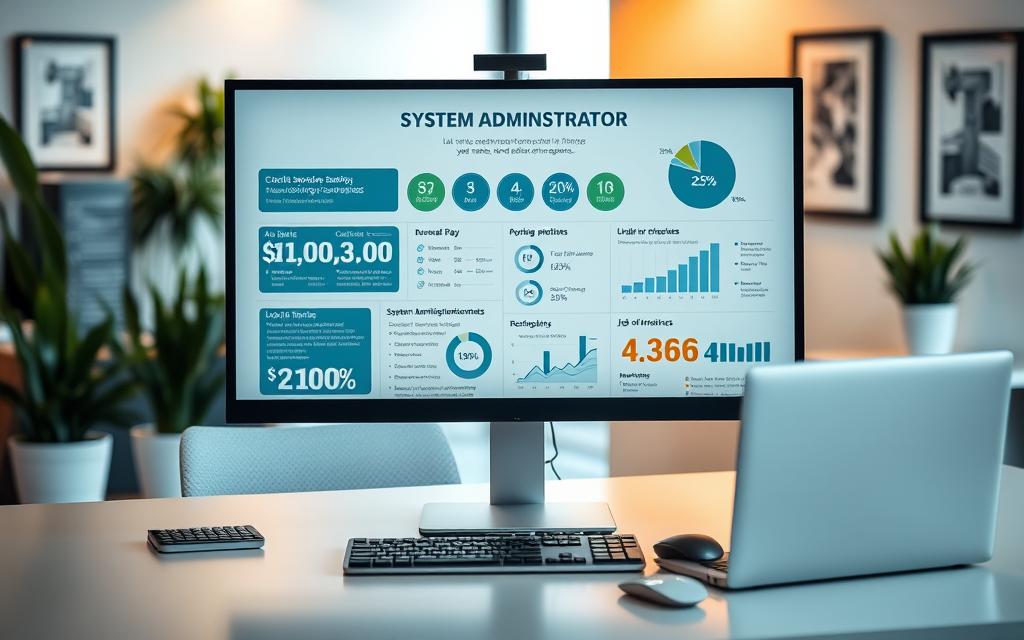What Does a System Administrator Do? Understanding Their Role
System administrators play a vital role in keeping organizations running smoothly. They ensure computer systems operate efficiently, handling everything from troubleshooting to server maintenance. These professionals are the backbone of information technology infrastructure, supporting users and maintaining hardware and software.
In 2022, the average salary for system administrators in the U.S. was $90,520, with a projected job growth of 2%. Their responsibilities include managing security protocols, optimizing networks, and ensuring data integrity. As businesses increasingly rely on cloud computing, modern system administration roles now demand expertise in cloud-based solutions.
Unlike network administrators, who focus on connectivity, system administrators oversee a broader range of tasks. They ensure that all IT components work seamlessly, making them indispensable to business operations. For those interested in this career, the Google IT Support Professional Certificate offers a solid entry pathway.
What Is the System Administrator on a Computer?
Behind every seamless IT operation lies the expertise of a skilled professional managing critical systems. These individuals ensure that servers, databases, and operating systems function without interruption. Their role is pivotal in maintaining the infrastructure that supports day-to-day business activities.
In smaller organizations, they often wear multiple hats, handling everything from hardware maintenance to user support. Larger enterprises may assign specialized roles, such as virtualization or database administrators. Regardless of the size, their primary focus remains on optimizing devices and ensuring uptime.
Critical systems under their management include file servers, security protocols, and RAID arrays. They also oversee physical hardware, such as printer networks and storage solutions. Real-world examples include managing Office365 environments or AWS instances, showcasing their adaptability to modern cloud-based solutions.
Common job titles in this field include virtualization administrator and database administrator. These roles highlight the diverse skill set required to manage complex IT environments. Whether troubleshooting or configuring systems, their work ensures that businesses remain connected and operational.
Key Responsibilities of a System Administrator
Organizations depend on skilled individuals to maintain and optimize their digital environments. These professionals ensure that hardware and software function seamlessly, while also safeguarding sensitive data and providing essential user support.

Managing Hardware and Software
One of the primary tasks involves overseeing both physical and virtual components. This includes configuring servers, updating software, and ensuring all devices operate efficiently. Regular maintenance and upgrades are crucial to prevent downtime and enhance performance.
Active Directory management is a critical aspect. Best practices include reviewing user accounts and permissions regularly. Implementing least privilege access ensures that users only have the necessary rights, reducing potential risks.
Ensuring Security and User Support
Security is a top priority. Professionals conduct audits, monitor firewalls, and implement measures like multi-factor authentication (MFA) to protect against unauthorized access. MFA adds an extra layer of defense, requiring users to verify their identity through multiple methods.
In case of incidents like ransomware attacks, swift action is essential. Protocols include isolating infected systems, engaging cybersecurity experts, and restoring data from secure backups. Post-incident analysis helps prevent future breaches.
Providing technical support is another key responsibility. From troubleshooting issues to assisting with software installations, these professionals ensure users can work without interruptions. Tools like Wireshark and CrowdStrike enhance their ability to analyze networks and detect threats.
System Administrator vs. Network Administrator: What’s the Difference?
Understanding the distinct roles of IT professionals helps businesses optimize their operations. While both positions are critical, their responsibilities and focus areas differ significantly. System administrators primarily manage servers, ensuring software and hardware function seamlessly. On the other hand, network administrators focus on switches, routers, and overall connectivity.
For example, managing a Cisco Catalyst switch involves configuring routing protocols and optimizing LAN and WAN performance. In contrast, Hyper-V administration revolves around virtual machines and server resources. These tasks highlight the technical divide between the two roles.
Cloud computing has further blurred traditional boundaries. Many professionals now handle both server and network tasks, especially in small and medium-sized businesses (SMBs). This overlap underscores the need for versatile skill sets in modern IT environments.
Deciding when to hire separate roles depends on your organization’s size and needs. Here’s a quick guide:
- Small businesses: A single IT professional can manage both roles.
- Mid-sized companies: Consider hiring specialists as operations grow.
- Large enterprises: Separate roles ensure focused expertise.
Certifications also reflect these distinctions. The CCNP (Cisco Certified Network Professional) focuses on advanced network skills, while the RHCE (Red Hat Certified Engineer) emphasizes server management. Choosing the right certification depends on your career goals.
“The evolution of IT roles demands adaptability. Professionals must stay updated with both server and network technologies to remain competitive.”
In summary, while both roles are essential, their focus areas differ. System administrators ensure servers run smoothly, while network administrators maintain connectivity and infrastructure. Understanding these differences helps businesses make informed hiring decisions.
Essential Skills for System Administrators
Mastering both technical and interpersonal abilities is crucial for success in IT roles. Professionals in this field must balance expertise in technology with strong soft skills to ensure smooth operations and effective collaboration.
Technical Skills: Operating Systems and Networking
Proficiency in operating systems like Windows, Linux, and macOS is essential. These platforms form the backbone of IT infrastructure, and understanding their nuances ensures efficient management.
Networking knowledge is equally important. Configuring routers, switches, and firewalls requires a deep understanding of protocols like TCP/IP and DNS. Tools like Wireshark can help analyze and troubleshoot network issues effectively.
Soft Skills: Communication and Problem-Solving
Strong communication skills are vital, especially during outages. Clear updates to stakeholders and users help manage expectations and reduce frustration. Following ITIL frameworks ensures structured incident management.
Escalation matrices provide clarity on who to contact during critical issues. Post-mortem reports document incidents, identify root causes, and outline preventive measures for the future.
Problem-solving is another key skill. IT professionals must quickly diagnose issues, implement solutions, and ensure minimal downtime. This requires analytical thinking and adaptability.
“Effective documentation and training are the cornerstones of a resilient IT environment.”
Collaboration and teamwork are also essential. IT teams often work together to resolve complex issues, making interpersonal skills critical for success. By combining technical expertise with soft skills, professionals can excel in their roles and drive organizational success.
How to Become a System Administrator
Starting a career in IT infrastructure requires a mix of education and hands-on experience. Most professionals in this field hold a bachelor’s degree in computer science or a related field. However, certifications like CompTIA A+ or Security+ can also open doors for entry-level roles.
For those pursuing a degree, expect to spend four years completing coursework in networking, operating systems, and cybersecurity. Alternatively, certifications can be earned in as little as six months, making them a faster pathway into the industry. Both routes require dedication and a focus on building technical skills.

Hands-on projects are crucial for gaining practical knowledge. Building a Proxmox cluster or configuring pfSense are excellent homelab projects to showcase your abilities. These tasks simulate real-world scenarios and demonstrate your readiness for the job.
Managed Service Providers (MSPs) often serve as entry points for aspiring professionals. Working in MSP tier systems allows you to gain exposure to diverse environments, from small businesses to large enterprises. This experience is invaluable for building a robust career path.
According to CompTIA certifications, employers typically seek candidates with 3-5 years of experience. Salary data from Dice.com shows that professionals with more experience earn significantly higher wages. For example, entry-level roles start around $50,000, while senior positions can exceed $100,000 annually.
“Combining formal education with practical projects is the key to success in IT roles.”
Whether you choose a degree or certifications, focus on continuous learning. The IT field evolves rapidly, and staying updated with the latest technologies ensures long-term career growth.
Top Certifications for System Administrators
Certifications are a powerful way to validate expertise and stand out in the competitive IT field. They demonstrate proficiency in specific technologies and enhance career prospects. Whether you’re starting out or advancing your career, the right certification can make a significant difference.

Vendor-Specific Certifications
Vendor-specific certifications focus on technologies from particular companies. Microsoft’s certifications, such as the Microsoft Certified: Azure Administrator Associate, are highly regarded for cloud and server management. Red Hat certifications, like the Red Hat Certified Engineer (RHCE), emphasize Linux system administration and are ideal for open-source environments.
General IT Certifications
General certifications provide a broader foundation in IT skills. CompTIA offers widely recognized credentials like the A+ and Network+ certifications. These cover essential topics such as hardware, software, and networking, making them ideal for entry-level professionals.
The Google IT Support Certificate is another excellent option. Its six-course structure prepares learners for roles in troubleshooting and user support. Many Fortune 500 companies accept this certification, and it serves as a stepping stone to the CompTIA A+ exam.
Here’s a quick comparison of certifications:
- Google IT Support Certificate: Focuses on foundational IT skills and prepares for CompTIA A+.
- CompTIA Network+: Covers networking concepts in depth, ideal for those focusing on connectivity.
- CCNA: A Cisco certification that delves deeper into networking, suitable for advanced professionals.
Choosing the right certification depends on your career goals. For those starting out, the Google IT Support Certificate and CompTIA A+ are excellent choices. For advanced roles, vendor-specific certifications like RHCE or CCNA provide specialized expertise.
“Certifications are not just credentials; they are proof of your commitment to mastering IT skills.”
For more details on CompTIA certifications, check out this resource.
System Administrator Salary and Job Outlook
The demand for skilled IT professionals continues to rise as technology evolves. According to the BLS, the average salary for these roles is $90,520, with a projected growth rate of 2% through 2032. This steady increase reflects the ongoing need for expertise in managing complex IT environments.
Regional variations significantly impact earnings. For example, professionals in the SF Bay Area earn higher wages compared to those in the Midwest. Below is a breakdown of average salaries by region:
| Region | Average Salary |
|---|---|
| SF Bay Area | $110,000 |
| Midwest | $85,000 |
| Northeast | $95,000 |
| South | $80,000 |
Cloud migration is reshaping traditional roles. As businesses adopt cloud-based solutions, professionals must adapt to new technologies like AIOps and GitOps. These skills are becoming essential for optimizing modern IT infrastructure.

Industries like Healthcare IT and FinTech are leading the way in hiring. These sectors prioritize robust IT systems to manage sensitive data and ensure compliance. For those pursuing a career in this field, staying updated with emerging trends is crucial.
To learn more about related roles and industry trends, check out this resource. The job outlook remains positive, making this an excellent time to invest in IT skills and certifications.
Conclusion
Effective management of IT infrastructure ensures seamless business operations. System administrators play a pivotal role in maintaining critical systems, from network security to user support. Their expertise keeps organizations running smoothly, even in complex environments.
Lifelong learning is essential in this field, especially with the rise of DevOps and cloud technologies. Staying updated with emerging trends and tools enhances your skills and career prospects. Continuous education ensures you remain competitive in a rapidly evolving industry.
For those starting their career path, the Google IT Support Certificate offers a solid foundation. It prepares you for entry-level roles and sets the stage for advanced certifications. Investing in such credentials can significantly boost your earning potential and job opportunities.
According to recent data, professionals with certifications earn higher salaries compared to their non-certified peers. The ROI on certifications is clear, making them a valuable investment for aspiring system administrators. Explore the Google IT Support Certificate to kickstart your journey today.
FAQ
What are the primary duties of a system administrator?
System administrators manage hardware, software, and networks. They ensure systems run smoothly, troubleshoot issues, and maintain security protocols.
How does a system administrator differ from a network administrator?
While both roles focus on IT infrastructure, system administrators handle overall system operations, including servers and software. Network administrators specialize in managing network devices like routers and firewalls.
What technical skills are essential for system administrators?
Proficiency in operating systems like Windows, Linux, and macOS is crucial. Knowledge of networking, server management, and troubleshooting tools is also vital.
What certifications are recommended for aspiring system administrators?
Vendor-specific certifications like Microsoft Certified: Azure Administrator or Red Hat Certified System Administrator are valuable. General IT certifications like CompTIA Network+ or Google IT Support are also beneficial.
What is the average salary for a system administrator?
Salaries vary by location and experience, but the average ranges from ,000 to ,000 annually. Specialized skills and certifications can increase earning potential.
What soft skills are important for system administrators?
Strong communication, problem-solving, and time management skills are essential. Administrators often work with teams and must explain technical issues to non-technical users.
How can someone start a career as a system administrator?
Begin with a degree in information technology or a related field. Gain hands-on experience through internships or entry-level IT roles. Pursue certifications to enhance qualifications.
What tools do system administrators commonly use?
Tools like Active Directory, VMware, and monitoring software such as Nagios are widely used. They also rely on scripting languages like PowerShell and Bash for automation.
What are the challenges faced by system administrators?
Common challenges include managing system downtime, ensuring data security, and staying updated with rapidly evolving technology trends.
How does system administration contribute to an organization’s success?
By maintaining reliable IT infrastructure, system administrators ensure seamless operations, protect sensitive data, and support productivity across the organization.















